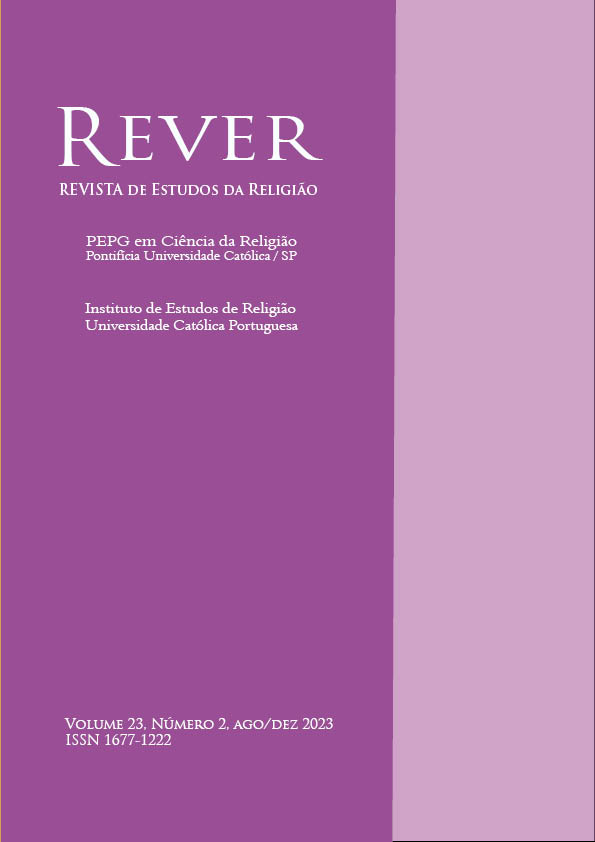Niilismo e religião na obra Pais e Filhos de Ivan Turguêniev
DOI:
https://doi.org/10.23925/1677-1222.2023vol23i2a10Palavras-chave:
Religião, Niilismo, Literatura russa, Ivan Turguêniev, Pais e FilhosResumo
Este ensaio provém de reflexões realizadas durante o estudo do componente curricular “Religião e Literatura”, cursado na Universidade Federal de Juiz de Fora sob a orientação do professor Jimmy Sudário Cabral, cujo objetivo foi analisar o conceito de niilismo e o seu impacto na reformulação do conceito de religião na literatura russa do século XIX. Justifica-se o presente estudo pela necessidade histórico-crítica de se reconhecer como os termos niilismo e religião aparecem em romances como “Pais e Filhos” de Ivan Turguêniev, escrito entre 1860 e 1862, embora já fosse um conceito presente na Rússia em literaturas secundárias em um período marcante devido ao término da servidão e ao surgimento de movimentos políticos que visavam derrotar o regime autocrático. É nessa obra que o escritor russo lança o termo “niilista” por intermédio do protagonista Ievguêni Bazárov, materialista positivista, opositor da geração de 1840 – os eslavinos idealistas defensores do romantismo – representando a geração dos anos de 1860, crítica dos valores e das convenções sociais. O problema em questão é verificar como está situada a perspectiva niilista e religiosa no enredo. A hipótese é de que o romance pesquisado aborda elementos suficientes para fazer tal análise. Trabalhou-se com a metodologia exploratória de caráter bibliográfico interpretativo, cujas fontes são originais e a análise qualitativa identificaria as teses “niilismo” e “religião” na obra em questão. Indica-se, por resultado, ampliar o debate acadêmico entorno desse escritor.
Referências
BACHVAROVA, Elitza Lubenova. O Homem de Coração: Reflexões acerca do ducentésimo aniversário de Turguêniev. In: Slovo – Revista de Estudos em Eslavística V. 2 N. 2 Jan. – Jun. 2019.
CEI, Vitor. Nietzsche, Turguêniev e o Niilismo. In. Theoria - Revista Eletrônica de Filosofia. Volume 03 - Número 07 - Ano 2011.
HEREN, Aleksandr. Outra vez Bazárov. RUS. v. 12 n. 18. Literatura Russa e Filosofia, 2021.
PERPÉTUO, Franco Irineu. Como ler os russos. São Paulo: Todavia, 2021.
TURGUÊNIEV, Ivan. Pais e Filhos. Tradução de Rubens Figueiredo. São Paulo: Companhia da Letras, 2019.
VOLPI, Franco. O niilismo. São Paulo: Loyola, 1999.
Downloads
Publicado
Como Citar
Edição
Seção
Licença

Este trabalho está licenciado sob uma licença Creative Commons Attribution-NonCommercial 4.0 International License.
Autores que publicam nesta revista concordam com os seguintes termos:
- Autores mantém os direitos autorais e concedem à revista o direito de primeira publicação, com o trabalho simultaneamente licenciado sob a Licença Attribution-NonCommercial 4.0 International, que permite o compartilhamento do trabalho com reconhecimento da autoria e publicação inicial nesta revista.
- Autores têm autorização para assumir contratos adicionais separadamente, para distribuição não exclusiva da versão do trabalho publicada nesta revista (ex.: publicar em repositório institucional ou como capítulo de livro), com reconhecimento de autoria e publicação inicial nesta revista.


